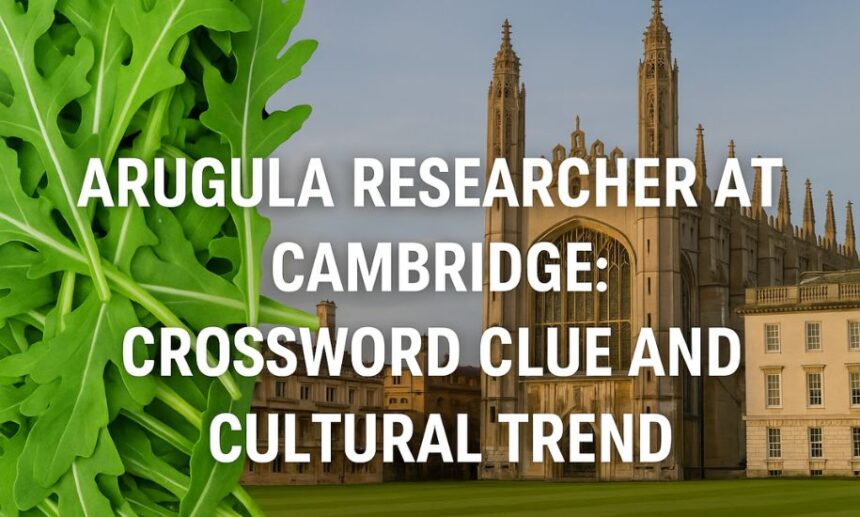Every once in a while, a simple crossword clue sparks an unexpected internet frenzy. In September 2024, one such clue did exactly that: “Arugula researcher at Cambridge?” What at first glance seems like a curious botanical riddle quickly unravels into a clever play on words. The answer—ROCKET SCIENTIST—highlights how wordplay, culture, and digital search behaviors intersect.
This article dives deep into the story behind the clue, the wave of “answers” pages and blog posts it spawned, the surprising role of “PDF” searches, and why the phrase arugula researcher at Cambridge continues to live on across blogs and forums. Whether you’re a crossword enthusiast, a linguistics fan, or just intrigued by how internet trends form, the tale of this clue offers much more than meets the eye.
Decoding the Clue: Arugula vs. Rocket
In the United States, the peppery salad green is widely known as arugula. In the United Kingdom, however, it is called rocket. That difference in naming—rooted in language history and culinary culture—sets up the joke perfectly.
So, what is an “arugula researcher at Cambridge”? Well, if arugula is “rocket” in British English, then a researcher of rocket in Cambridge (home of the prestigious University of Cambridge) would logically be a ROCKET SCIENTIST.
This clue appeared in the LA Times Crossword on September 18, 2024, and was quickly flagged as one of the standout wordplays of the puzzle. It drew smiles from solvers, especially those familiar with the UK/US food-naming divide.
Why Crossword Clues Go Viral
Crossword puzzles have long been a niche pastime, but digital platforms and answer-sharing communities have amplified their reach. Now, when a particularly clever or confusing clue appears, thousands of solvers search for explanations and answers online.
That’s exactly what happened with “arugula researcher at Cambridge.” Within hours of the puzzle’s publication, searches like:
-
“Arugula researcher at Cambridge answers”
-
“Arugula researcher at Cambridge crossword clue”
-
“Arugula researcher at Cambridge pdf”
began spiking on search engines. The blend of academic imagery, botanical vocabulary, and humor made the clue irresistible as a meme-like phrase.
The Rise of “Answers” Pages
The internet is filled with crossword solution sites. Once the clue appeared, dozens of them published dedicated posts:
-
LAXCrossword explained the clue in detail, pointing out the “arugula = rocket” equivalence.
-
LATSolver and Try Hard Guides listed ROCKET SCIENTIST as the official answer, often with breakdowns of letter counts.
-
7LittleWordsAnswers and CrosswordGenius joined in, providing quick confirmation for solvers.
For many crossword fans, these sites are daily companions, ensuring that tricky clues don’t derail the solving experience. For search engines, they’re also high-value SEO pages, drawing in thousands of visitors with keyword-targeted posts like “Arugula researcher at Cambridge answers.”
The “PDF” Connection
Why did “arugula researcher at Cambridge pdf” emerge as a related keyword? The answer lies in user behavior. Many crossword solvers prefer printable PDFs of puzzles rather than solving online. Some look specifically for LA Times PDF archives, while others seek printable collections to solve offline.
Though official LA Times puzzles are available via subscription, third-party sites often advertise “PDF” versions. This explains the rise in search traffic around “arugula researcher at Cambridge pdf”—it’s less about the clue itself and more about how people prefer accessing the puzzle.
Still, the association stuck, and “PDF” became part of the cluster of trending keywords attached to the clue.
How Blogs Picked Up the Phrase
Soon after the crossword clue gained traction, blogs and SEO-driven websites began publishing posts titled around “arugula researcher at Cambridge.” Interestingly, most of these posts had little to do with the crossword itself.
Instead, they explored:
-
Arugula as a healthy leafy green.
-
The idea of plant research at prestigious institutions like Cambridge.
-
Sustainable agriculture and “rocket” as a crop.
-
Loose metaphors comparing scientists to rocket scientists.
Examples included sites like ResourceTech, Forbeas.com, Skelabs, and The Styles Magazine, each spinning the phrase into lifestyle, health, or agriculture-oriented content.
These blog posts illustrate how keyword hijacking works: when a phrase trends, content creators repurpose it for relevance, traffic, and clicks—even if the original context was purely crossword humor.
Real Research at Cambridge
For clarity, it’s important to note: there is no known official “arugula researcher at Cambridge” in reality. Cambridge University is home to world-class plant science, especially at the Sainsbury Laboratory (SLCU), where scientists study plant development, genetics, and crop sustainability.
Their work covers broad themes—climate change resilience, photosynthesis optimization, and genetic adaptation. While arugula may not be a focus crop, the lab’s research on plant biology could certainly be applied to leafy greens like arugula.
Thus, while the crossword clue is fictional, it resonates because the image of a serious plant scientist at Cambridge feels plausible.
Crossword Culture and Search Ecosystems
The journey of “arugula researcher at Cambridge” highlights a fascinating cultural loop:
-
Puzzle creation – A clue writer at the LA Times invents a witty entry.
-
Puzzle solving – Thousands of solvers encounter it simultaneously.
-
Search traffic – Many search engines see keyword spikes within hours.
-
Answer sites – Crossword-focused pages publish “answers” content.
-
Blogs – Non-crossword blogs exploit the keyword for clicks.
-
User behavior – “PDF” searches and related queries broaden the cluster.
In other words, a simple crossword clue evolves into a digital footprint that lasts far longer than the puzzle itself.
Why This Clue Stood Out
Some crossword clues come and go unnoticed. This one stuck because:
-
Dual wordplay: It hinges on a cultural naming difference (“arugula” vs. “rocket”).
-
Prestige location: Cambridge invokes global recognition and intellectual prestige.
-
Unexpected answer: Solvers delight in realizing that the whimsical clue leads to a serious term like “rocket scientist.”
-
SEO magnet: The odd phrasing made it perfect for keyword-based content creation.
The result is a clue that not only entertained solvers but also seeded an ongoing trend across blogs and searches.
Conclusion: From Lettuce to Legacy
The phrase “arugula researcher at Cambridge” began as nothing more than a clever crossword entry. Yet, it became a case study in how puzzles, language, and digital behavior intersect. From answer pages to “PDF” searches to opportunistic blog posts, the clue’s life extended far beyond its crossword grid.
It’s a reminder that even the smallest sparks of wordplay can ripple across the internet—shaping search trends, inspiring content, and creating moments of shared cultural amusement.
And as for real-world plant research? Cambridge continues to lead the way in understanding plant development and agriculture. So while no single “arugula researcher at Cambridge” exists, the clue nevertheless celebrates the spirit of curiosity, wordplay, and science.
Final Note
This article is proudly featured by Tumblr Magazine, your go-to destination for exploring culture, trends, and the curious stories that shape our digital world.







